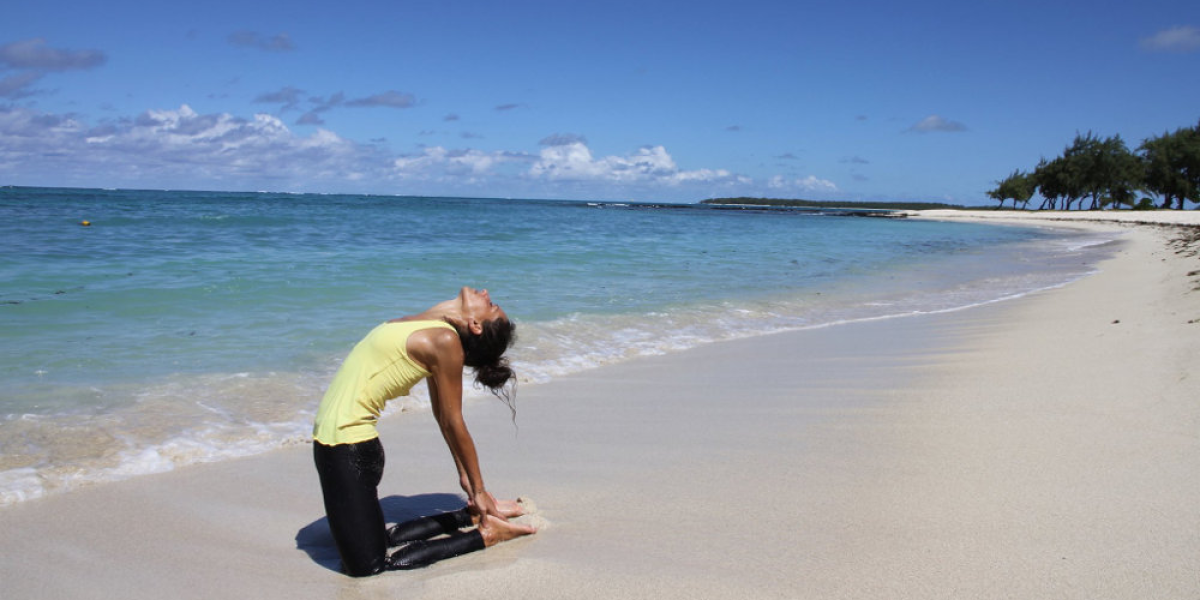
While the yogis around the world are taking their positions on International Yoga Day, Expat.com speaks to Nathalie, a body and mind yoga and fitness instructor, about the benefits of yoga and her decision to move to Mauritius. After having lived in Belgium, France, Spain and Singapore, Nathalie decided to come to Mauritius and discover her roots while she's praising a holistic approach to health and life.
Hi, Nathalie, can you tell us a few things about yourself? Where are you from? How long have you been living in Mauritius?
Hi! Delighted to be here with you today! I am half Mauritian, half from Luxembourg. I was born and raised in Belgium, and lived in several countries in Europe and Asia, before settling in Mauritius almost two years ago.
How did you decide to come to Mauritius?
Moving to Mauritius has been in the back of my mind for quite some time now. I felt the need to get a little closer to this side of my origins. So I finally decided to take a leap of faith, and here I am!
What's your favourite thing about Mauritius?
Quoting Mark Twain, “Mauritius was made first, and then heaven, and heaven was copied after Mauritius”. The island has a stunning nature — beyond the cliché stunning beaches and turquoise waters, there are countless natural wonders and breathtaking landscapes worth discovering. From natural reserves, forests and cascades to parks, and other hidden gems!
How did you get into yoga? What type of yoga do you teach?
I'm originally a martial artist. I started practising yoga as a complement to martial arts and deepened my practice when I was suffering from injuries. Very quickly, one understands that there are quite a few similarities between the two disciplines — focus, balance, strength, flexibility, breath control, just to name a few.
The style of yoga I enjoy practising and sharing is called Vinyasa Yoga or Vinyasa Flow, a graceful sequence that coordinates movement with the flow of breath from one pose to the next.
No two Vinyasa Yoga practices are similar, and the intensity can vary from a soft and introspective sequence to an intense and challenging one. There is always a right flow for how you feel at a particular place and time!

What are the benefits of yoga in our daily lives?
The Indian sage Patanjali in his book “Yoga Sutra of Patanjali”, written around 2,000 years ago and still considered as one of the foundations of classical yoga philosophy, outlines eight limbs of yoga: Yamas (moral and ethical disciplines), Niyama (virtuous habits and observances), Asana (physical postures), Pranayama (conscious regulation of the breath), and the control of Prana (life force), Pratyahara (withdrawal of senses), Dharana (concentration, introspective focus), Dhyana (contemplations, abstract meditations), Samadhi (the Union, the Harmonious Whole).
Today most people practicing yoga mainly focus on the third limb, Asana, which is a sequence of physical postures designed to purify the body and provide the physical strength and stamina required for long periods of meditation.
The most underlying benefits of this practice are improved cardiovascular health, agility, strength and balance. On a deeper level, the practice of Asana is also used as a tool to calm the mind and move into the inner essence of being, hereby exploring and controlling emotional aspects, concentration, faith, and unity between the physical and the ethereal body. Wellness, happiness, peace of mind, self-care and mental clarity are elements of the result of a regular yoga practice.
Then, as we discover these eight limbs, we begin by readjusting our behaviour in the outer world, and then we focus inwardly until we reach Samadhi (liberation, enlightenment).
Are there any myths about yoga that we shouldn't believe in?
Probably one of the most common myths is that people think they need to be flexible to practice Yoga. As stated above, yoga is not about flexibility. It's about connecting with your body, mind and soul. Movements are orchestrated to keep the energy flowing within your body, and much less about creating beautiful poses to post on Instagram. We all have beautiful different bodies. Love and embrace yours as it is!
In your opinion, what is that has made yoga so universal and appealing?
Practising yoga is a chance to relax and treat yourself physically, mentally and/or spiritually. When practised regularly, it will help you build strength, flexibility, get healthier and happier, reconnect your mind and your body into a beautiful, self-aware, ever-improving whole.
Plus, each pose has both beginner's and more advanced versions, and while beginner's yoga can be practised by anyone regardless of ability, the advanced postures can be very challenging, even for long-term practitioners.
Do Mauritians practice yoga, or do you mainly work with expats, and what's the average profile of your students?
It has become more and more common to find yoga classes in local community centres or organised by local city councils. Personally, I would say that half of the people practising Yoga with me are Mauritian, and half are expats. There is, of course, a higher percentage of female yoginis, although I am delighted to see that more and more men are starting to become regular practitioners too.
How do you find the lifestyle in Mauritius? Is it healthy for the body and the soul?
Mauritius has a lot to offer If you want to live healthily — easy access to nature to either swim in the ocean or do other water sports, go on hikes and treks. Vegetarian dishes are also quite easy to find, and there are an increasing number of biofarming and permaculture sites to source natural products. Then again, it lies in your hands to make your life as healthy as possible!
Where is your favourite outdoor spot in Mauritius to do yoga?
Could you dream of a better spot than a quiet beach at sunrise or sunset?
Namaste.



















